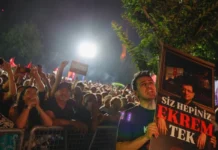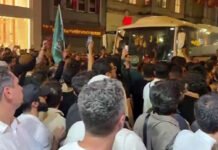Turkey’s Foreign Minister Mevlüt Çavuşoğlu said NBA player Enes Kanter’s world tour was disrupted as part of the government’s post-coup crackdown against the alleged members of Gülen movement on Wednesday.
Speaking during a ruling Justice and Development Party (AK Party) meeting in Afyonkarahisar province, Çavuşoğlu said that “Some institutions affiliated with the movement used to have recognition within the United Nation’s Economic and Social Council. Among those intitutions were Kimse Yok Mu, Journalists and Writers Foundation and TUSKON. Their statuses were withdrawn as a result of our efforts. We prevented Enes Kanter from completing his world tour which he started for propaganda purposes. He was expelled from three countries.”
Turkish government holds the Gülen movement responsible for the July 15, 2016 coup attempt while the latter denies involvement. More than 126,000 people have been detained over ties to the movement in Turkey so far while Turkish autocratic President Recep Tayyip Erdoğan earlier called on foreign governments to punish the followers of the Gülen movement in their own countries. In May Saudi Arabia, Malaysia, Georgia and Myanmar handed over academics, businessmen and school principals upon the Turkish government’s request.
Enes Kanter also fell victim to the government’s worldwide net against the alleged members of the Gülen movement after he pledged support to the movement. His passport was briefly seized by Romanian police upon a request from the Turkish government. Once he landed in the US, Kanter revealed that Turkish government had tried to catch him also in Indonesia.
“I was sleeping around 2:30 or something and my manager knocked on my door. He said the Secret Service and the Indonesian army were looking for me because the Turkish government told them I was a dangerous man,” Kanter said.
Çavuşoğlu continued that the government took part in bringing back the alleged members of the Gülen movement from overseas. “We brought back FETO’s Myanmar imam. We took back FETO supporters from Malaysia, Azerbaijan, Qatar and Saudi Arabia. Schools and language centers linked to FETO stopped operating in 15 countries: Gambia, Azerbaijan, Tajikistan, Libya, Jordan, Dominic Rebuplic, Morocco, Rwanda, Kuwait, Tunisia, Montenegro, Maldives, Madagascar and Ivory Coasts. [State-supported] Maarif Foundation took over such schools Guinea, Somalia, Niger, Sudan and Congo. We are making every effort to take over their schools in other countries as well,” he added.
Officials from several Turkish institutions were actively involved in the forced return of Malaysian-based followers of the Gülen movement, according an earlier Anadolu news agency (AA) report. Meanwhile, Muhammet Furkan Sökmen, a Turkish national working for two schools established by the followers of the Gülen movement in Myanmar, was forcibly returned to Turkey in June this year.
The Turkish government’s blatant abuse of the International Criminal Police Organization (Interpol) to persecute, harass and intimidate critics and opponents is much worse than one can imagine, a research by Stockholm Center for Freedom (SCF), an advocacy group that tracks rights violations in Turkey, has revealed.
“The dubious and false charges filed by Turkey through Interpol to hunt down legitimate critics of Turkey’s autocratic President Recep Tayyip Erdoğan have in some cases succeeded in extraditing people from abroad, subjecting returnees to torture and ill treatment in notorious Turkish prisons. In other cases, people were stranded in third countries while travelling and were forced to fight the forcible return as they remained in detention facilities,” said the SCF report.
Leading NGOs, such as Fair Trials in the UK, the New York-based Human Rights Watch, and Reporters Without Borders in Paris, have also urged the Interpol to weed out abuses.
Turkey survived a controversial military coup attempt on July 15, 2016 that killed 249 people. Immediately after the putsch the ruling Justice and Development Party (AKP) government along with Turkey’s autocratic President Recep Tayyip Erdoğan pinned the blame on the Gülen movement.
Fethullah Gülen, who inspired the movement, strongly denied having any role in the failed coup and called for an international investigation into it, but President Erdoğan — calling the coup attempt “a gift from God” — and the government initiated a widespread purge aimed at cleansing sympathizers of the movement from within state institutions, dehumanizing its popular figures and putting them in custody.
Turkey’s Justice Ministry announced on July 13 that 50,510 people have been arrested and 169,013 have been the subject of legal proceedings on coup charges since the failed coup. (SCF with turkeypurge.com)















